Liberation theology is a Christian theological approach emphasizing the liberation of the oppressed. It engages in socio-economic analyses, with social concern for the poor and political liberation for oppressed peoples and addresses other forms of inequality, such as race or caste.
Gaudium et spes, the Pastoral Constitution on the Church in the Modern World, is one of the four constitutions resulting from the Second Vatican Council in 1965. It was the last and longest published document from the council and is the first constitution published by an ecumenical council to address the entire world. Gaudium et spes clarified and reoriented the role of the church's mission to people outside of the Catholic faith. It was the first time that the church took explicit responsibility for its role in the larger world. The constitution's creation was necessitated by fear of the church's irrelevance in the modern era due to its ignorance on problems that plague the modern world. The document represents an inner examination of the church by the council and features a response to problems affecting the modern world.
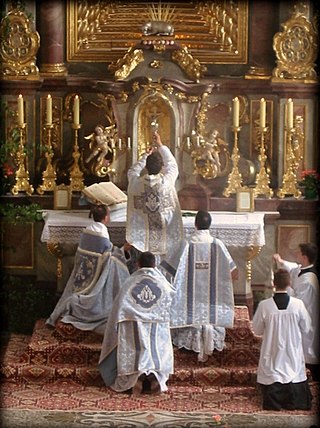
Traditionalist Catholicism is a movement encompassing members of the Catholic Church and offshoot groups of the Catholic Church that emphasizes beliefs, practices, customs, traditions, liturgical forms, devotions and presentations of teaching associated with the Catholic Church before the Second Vatican Council (1962–65). Traditionalist Catholics particularly emphasize the Tridentine Mass, the Roman Rite liturgy largely replaced in general use by the post-Second Vatican Council Mass of Paul VI.
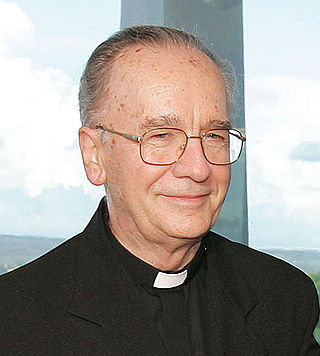
Cláudio Hummes, OFM was a Brazilian prelate of the Catholic Church. He was prefect of the Congregation for the Clergy from 2006 to 2010, having served as Archbishop of Fortaleza from 1996 to 1998 and Archbishop of São Paulo from 1998 to 2006. A member of the Order of Friars Minor and an outspoken proponent of social justice, he was made a cardinal in 2001.

Pope Francis is the head of the Catholic Church, the bishop of Rome and sovereign of the Vatican City State. He is the first pope to be a member of the Society of Jesus (Jesuits), the first from the Americas, the first from the Southern Hemisphere, and the first to be born or raised outside Europe since the 8th-century papacy of the Syrian Pope Gregory III.
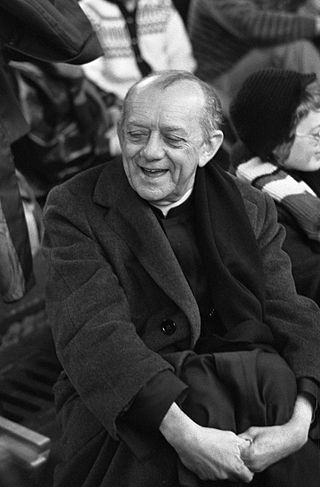
Hélder Pessoa Câmara was a Brazilian Catholic archbishop. A self-identified socialist, he was the Archbishop of Olinda and Recife, serving from 1964 to 1985, during the military dictatorship in Brazil. He was declared a Servant of God in 2015.

The Second Episcopal Conference of Latin America was a bishops' conference held in 1968 in Medellín, Colombia, as a follow-up to the Second Vatican Council which it adapted in a creative way to the Latin American context. It took as the theme for its 16 documents “The Church in the Present Transformation of Latin America in the Light of the Council", with a focus on the poor and oppressed in society. It recognized that “the social situation demands an efficacious presence of the Church that goes beyond the promotion of personal holiness by preaching and the sacraments.” The bishops agreed that the church should take "a preferential option for the poor" and gave their approval to Christian "base communities" in which the poor might learn to read by reading the Bible. The goal of the bishops was to liberate the people from the "institutionalized violence" of poverty. They maintained that poverty and hunger were preventable.
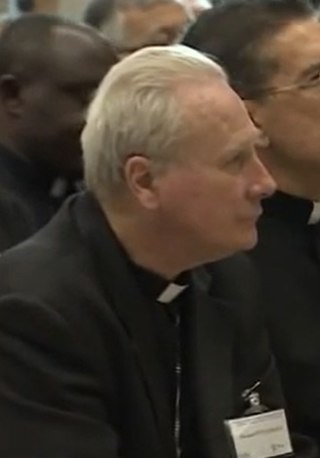
Michael Louis Fitzgerald is a British cardinal of the Roman Catholic Church and an expert on Christian–Muslim relations. He has had the rank of archbishop since 2002. At his retirement in 2012, he was the apostolic nuncio to Egypt and delegate to the Arab League. He headed the Pontifical Council for Interreligious Dialogue from 2002 to 2006. Pope Francis raised him to the rank of cardinal on 5 October 2019.
A base community is a relatively autonomous Christian religious group that operates according to a particular model of community, worship, and Bible study. The 1968 Medellín, Colombia, meeting of Latin American Council of Bishops played a major role in popularizing them under the name basic ecclesial communities. These are small groups, originating in the Catholic Church in Latin America, who meet to reflect upon scripture and apply its lessons to their situation.

Giacomo Lercaro was an Italian cardinal of the Roman Catholic Church who served as Archbishop of Ravenna from 1947 to 1952, and Archbishop of Bologna from 1952 to 1968. Pope Pius XII made him a cardinal in 1953.

Antonio Poma was an Italian cardinal of the Catholic Church. He served as Archbishop of Bologna from 1968 to 1983, and was elevated to the cardinalate in 1969.

Athanasius Schneider, O.R.C. is a Catholic prelate, serving as the Auxiliary Bishop of Astana in Kazakhstan. He is a member of the Canons Regular of the Holy Cross of Coimbra. He is known for championing the pre-Vatican II liturgical traditions and practices of the Church and for protesting certain current policies, including some associated with Pope Francis.

Gerhard Ludwig Müller is a German cardinal of the Catholic Church. He served as the Cardinal-Prefect of the Congregation for the Doctrine of the Faith (CDF) from his appointment by Pope Benedict XVI in 2012 until 2017. Pope Francis elevated him to the rank of cardinal in 2014.
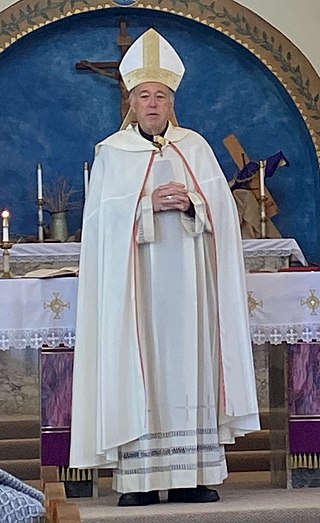
Robert Walter McElroy is an American prelate of the Catholic Church who has served as the sixth bishop of the Diocese of San Diego in California since 2015.

Luis Antonio Gokim Tagle is a Filipino prelate of the Catholic Church currently serving as the Pro-Prefect for the Section of Evangelization of Dicastery for Evangelization since June 5, 2022, and as the President of Interdicasterial Commission for Consecrated Religious since December 8, 2019. He was the 32nd Archbishop of Manila from 2011 to 2019. Tagle is the Cardinal-Bishop of San Felice da Cantalice a Centocelle and also serves as the President of the Catholic Biblical Federation, Grand Chancellor of the Pontifical Urbaniana University, and as a member of various departments and dicasteries in the Roman Curia.

Luigi Bettazzi was an Italian prelate of the Catholic Church who was bishop of Ivrea from 1966 to 1999. One of the youngest and most junior participants in the Second Vatican Council, he was one of the original signatories of the Pact of the Catacombs.

Elected on 13 March 2013, Francis is the first member of the Society of Jesus to be appointed pope and the first non-European to hold the office since the 8th century. He described his papal name as pointing to what he wants to emulate in Saint Francis of Assisi: to have a poor church, for the poor, always going out to the margins, and to show concern for the natural environment. His papal motto Miserando atque eligendo contains a central theme of his papacy, God's mercy, which has led to conflict with orthodox Catholics on issues such as reception of Communion by remarried Catholics. In addressing real life situations he often appeals directly to his experience, in continuity with his synodal way, which showed a renewed emphasis on listening and dialogue. He has placed greater emphasis on church synods and on widespread consultation and dialogue, uplifting the roles of laypersons and of women in the Catholic church and criticizing clericalism.
Ecclesiae Sanctae – "(Governing) of the Holy Church" – is an apostolic letter or motu proprio issued by Pope Paul VI on August 6, 1966. Paul wrote this letter on how to implement the Vatican Council, especially as regards the conciliar documents Christus Dominus, Presbyterorum Ordinis, Perfectae Caritatis, and Ad Gentes.

Mauro Gambetti OFMConv is an Italian prelate of the Catholic Church who was appointed archpriest of Saint Peter's Basilica, Vicar General for the Vatican State, and president of the Fabric of Saint Peter on 20 February 2021. He was consecrated a bishop on 22 November 2020 just before Pope Francis raised him to the rank of cardinal on 28 November 2020.
Latin American liberation theology is a synthesis of Christian theology and Marxian socio-economic analyses, that emphasizes "social concern for the poor and political liberation for oppressed peoples". Beginning in the 1960s after the Second Vatican Council, liberation theology became the political praxis of Latin American theologians such as Gustavo Gutiérrez, Leonardo Boff, and Jesuits Juan Luis Segundo and Jon Sobrino, who popularized the phrase "preferential option for the poor". It arose principally as a moral reaction to the poverty and social injustice in the region, which Cepal, a leftist think tank, deemed the most unequal in the world.















